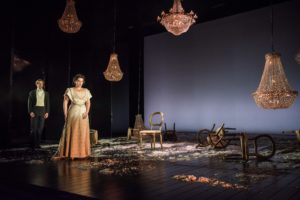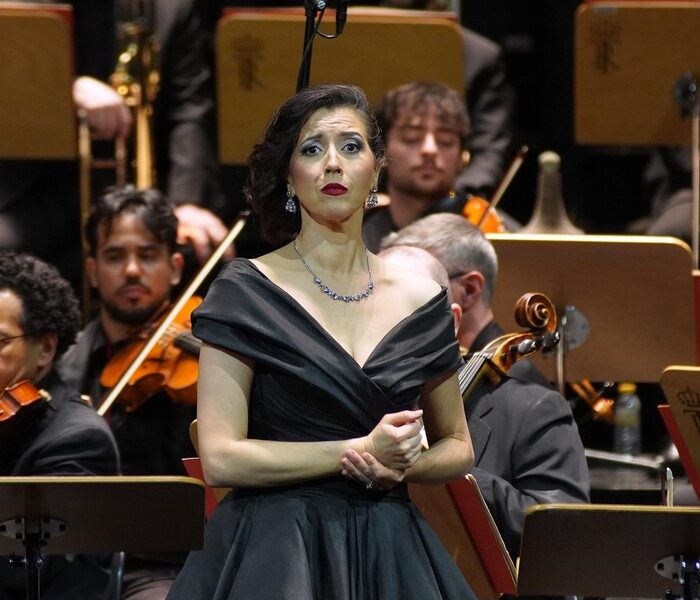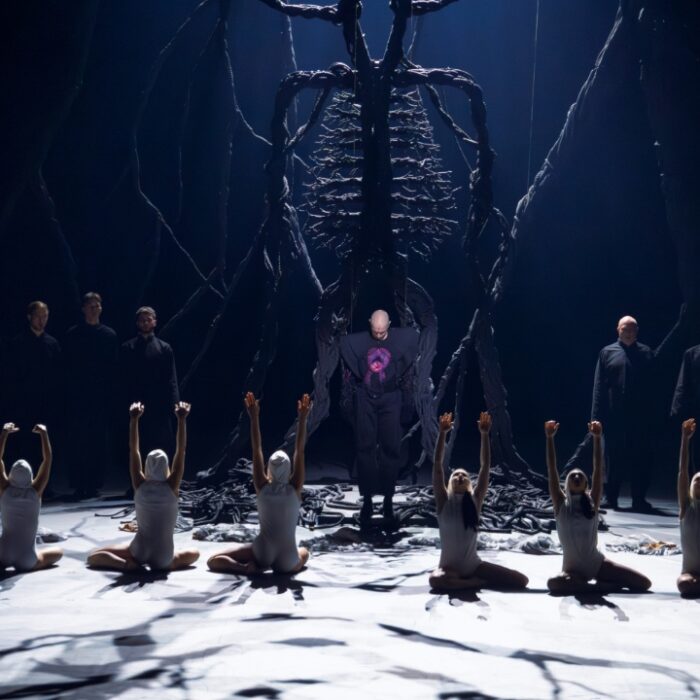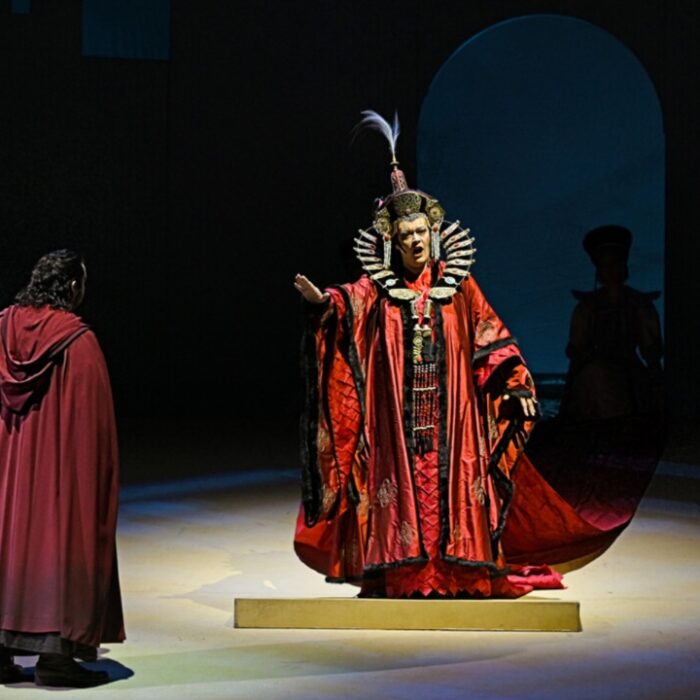
Buxton Festival 2019 Review: Eugene Onegin
Manton’s Strong Direction Produces Emotionally Charged Reading
By Alan Neilson(Credit: Genevieve Girling)
Buxton Festival kicked off their program of operas with “Eugene Onegin,” Tchaikovsky’s work of love, passion, rejection and regret, set among the decadent leisured class of 19th century Imperial Russia, a class which was soon to meet its end at the hands of the communists in the 1917 revolution. Firmly rooted in the Romantic tradition, the opera is whirl of intense and self-indulgent emotions, brilliantly magnified by its lavish and richly colored score.
All About Emotions
In what was a largely traditional staging, director, Jamie Manton displayed considerable skill in developing characterization, to which he brought insight, clarity and depth, which not only successfully defined the protagonists, but also set them in opposition to each other, and intensified the emotional and dramatic tensions.
Lensky’s self-indulgent, emotional excesses was put into sharp relief against Onegin’s cold, ironic demeanor and vice-versa, while Olga’s open and joyful nature magnified Tatyana’s sensitivity. Emotionally fraught scenes, predicated on the characters’ different emotional and psychological dispositions, brought depth and understanding to their interactions and magnified the dramatic impact. During the ballroom scene Lensky’s confronts Onegin over his behavior towards Olga, and demands satisfaction in a duel. As Onegin is about to leave, Lensky still raging, throws a drink over Onegin, who barely manages to maintain his dignified bearing. Manton’s work ensured that the scene developed in an almost inevitable fashion, the behavior of Lensky and Onegin a natural extension of their characters.
Moreover, Manton, aided by choreographer, Jasmine Rickets, always ensured that the scenes were well constructed. The duel scene was not the normal static affair, but was given more life, as Lensky and Onegin, against a blood red background, circle each other before firing.
The designer, Justin Nardella, responsible for scenery and costumes, met with mixed results. On the positive side the traditional costumes were colorful and pleasing on the eye. They placed the characters clearly in their roles, and highlighted their natures. Onegin was always elegantly and correctly dressed, while Lensky’s green coat and awkward looking hat gave him a bohemian slant. Olga’s pastorally colored, simple attire defined her well grounded personality, while Tatyana’s more sumptuous and refined dresses reflected her higher sensitivities.
The scenery, however, was largely unimaginative and did not fully exploit the work’s potential for grandeur and splendor, although to be fair to Nardella, the small size of the Buxton stage was a constraining factor. Props were basic, mainly confined to a few chairs and chandeliers, and the backdrop was a white screen. It was left to Zoe Spurr’s bold and evocative lighting designs to bring depth and color to the presentation.
The staging, however, was not without its merits; Nardella’s symbolic use of dead leaves, and sometimes covered, sometimes uncovered chandeliers, for example, highlighted the distinction and expectations that existed between the country life of Olga and Tatyana and the cosmopolitan city life of Onegin. His use of mirrors to reflect the audience was also imaginative, and having the area behind a mirror illuminate to reveal Onegin surrounded by demonic characters was excellent: is he Tatyana’s angel or the devil himself? It was the most powerful image of the evening!
Cultured & Captivating
George Humphreys’ Eugene Onegin was correct and cultivated, yet unable to fully engage with the society around him. His disposition was cold and rigid, and often laced with heavy irony, although he was unafraid of giving way to his passion on occasions, and was not a totally unsympathetic character.
His rejection of Tatyana in Act one was gentle, rather than unfeeling, and his reaction to Lensky’s jealousy was a result of intense provocation. It was a subtle and convincing portrayal, one that brought out Onegin’s emotional depths. Humphreys’ success was in no small part down to his excellent vocal performance, which through his ability to infuse his singing with meaning and emotional nuance was able to reveal his multi-layered personality.
David Webb put in an excellent performance as Lensky, the dreamy dullard, whose pretensions are cruelly exposed at every turn. Webb’s voice possesses an attractive an engaging timbre, and his sensitively crafted phrasing successfully reflected his emotional state, which clearly brought out the underlying melancholia of his character.
Likewise he managed to convey Lensky’s anger and rising frustrations experienced in his confrontation with Onegin during the Act two ball; arguably the production’s strongest scene. The conflict grew against a background of dancing, which escalated convincingly into Lensky challenging Onegin to a duel. Humphreys and Webb’s identification with their characters produced a full-blooded and dynamic encounter, in which their passions moulded their singing to create a fiery confrontation.
Tatyana was played by the young American soprano, Shelley Jackson, who is currently building a strong reputation for herself on the international stage. She gave a dramatically intense presentation, which captured the inner conflicts of Tatyana’s struggle between her emotional drives, her moral decency and loyalty towards her husband. She possesses a well supported voice, which blooms brightly in the upper register, but to which she is able to add depth through subtle coloring.
The letter scene was delivered effectively, if not outstandingly so, in an emotional and expressive rendition, in which she gave careful consideration to inflections and emotional stresses, but owing to an intermittent lack of dynamic control led to the occasional squally outburst. The final scene, however, in which Tatyana rejects Onegin’s pleas regardless of the love she still feels for him, suffered from no such problems, in what was an attractive and emotionally explosive portrayal.
Filling In The Color
Angharad Lyddon’s characterisation of Tatyana’s sister, Olga, was perfectly contrasted with Jackson’s Tatyana. She brought out the positive, fun-loving nature of her character, free from the naïve ideas of love and the burdens of an overbearing morality which beset her sister. Vocally, she gave an engaging performance; her aria, “Uzh kak po mostu, mostocku,” in which she gives voice to her joie-de-vivre, was delightfully sung, displaying the rich warm timbre of her voice, in an open, free-singing, attractive rendition.
The mezzo-soprano, Ceri Williams, was parted as the homely Nanny, Filippyevna, who fussed over Tatyana and Olga. It was a stereotypical portrayal, and worked perfectly. Williams produced a vibrant performance, underpinned by her colourful mezzo, and nicely articulated phrasing
Prince Gremin was given a powerful presentation by the bass, Joshua Bloom. He possesses a rich and authoritative voice, which he projects with meaning and force. Although only a relatively small role he was able to create an immediate and strong impression.
The tenor, Joseph Doody, was foppish, over-the-top, Triquet, who successfully managed to claim the centre of attention with his lyrical singing of “A cette fete conviés.”
Madame Larina was played by the mezzo-soprano, Gaynor Keeble. She has a formidable voice, with a pleasing tone, although she often sang with too much power, which occasionally brought an imbalance into ensembles.
The chorus produced an excellent performance. Their singing was energetic and dramatically engaging, and their acting superbly choreographed, which did much to enrich the staging.
Adrain Kelly conducted the Northern Chamber Orchestra, in what was eventually a spirited performance, which caught the dramatic tensions within the work, and the grandeur and joy of the dance. However, the first act was a little slow to catch the attention, in which the balance between the orchestra and the stage was not always managed effectively, the singers often overpowering the orchestra, and impacting the dramatic integrity, which was particularly noticeable during the quartet, “Skazhi, kotoraya Yatyana,” giving it a disconnected feel. Kelly, however, was able to successfully bring this under control.
It may not have been the best “Eugene Onegin,” and there were certainly areas in which improvements could be made, most notably to the unimaginative scenery, but it had much to recommend, not least, Manton’s direction, which brought considerable depth to the characters, and with which the singers were always fully engaged. Also musically, notwithstanding a few imbalances in the early part, it was a satisfying presentation, with many good singing performances.


